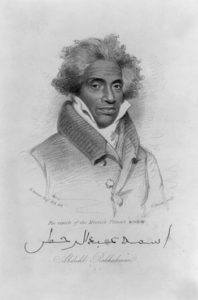
Abdul Rahman Ibrahima Sori
*The birth of Abdul Rahman Ibrahima Sori is celebrated on this date in 1762. He was a Black African royal and American slave.
Abdul Rahman Ibrahima was a Torodbe Fulani Muslim prince from Guinea, West Africa. He was the son of Ibrahima Sori and a Moorish wife. Abdul Rahman studied in a madrasah, speaking several African languages and Arabic. On returning home in 1781, he joined his father's army and commanded 2000 cavalry troops. This combat was for a campaign against the 'Hebohs' during the Middle Passage. Though he initially defeated the Hebohs, they later ambushed his cavalry in the mountains, and he was shot, captured, and enslaved. He was married at his capture, having had a son.
Abdul Rahman was sold onto the slave ship Africa. Trans-shipped via Dominica to New Orleans, then to Natchez, Mississippi, where he and another slave were sold to Thomas Foster. There, he labored for more than thirty-eight years before gaining his freedom. On Christmas Day, 1794, he married Isabella, another slave of Foster's, and eventually fathered a large family of nine children. Isabella would join the Baptist Church by 1797. Abdul Rahman regularly attended services with his family by 1818, but he continued to have objections to those aspects of Christianity that contradicted the Islamic faith.
Being viewed as loyal and trustworthy, he showed an aptitude for managing cattle and supervising other enslaved people in growing cotton. Due to this status, he could walk to a local market in Washington, Mississippi, to sell vegetables. In 1826, at the encouragement of a local newspaperman, Abdul Rahman wrote a letter in Arabic to his family that was forwarded to the U.S. Consulate in Morocco. He shared the letter with Sultan Abderrahmane II. He asked President John Quincy Adams to intervene in his release.
Following this intervention, in 1828, Thomas Foster agreed to release Abdul Rahman and his wife without payment. They traveled to Baltimore, and on May 15, he had an audience with President Adams, to whom he expressed his desire to see his five sons and eight grandchildren emancipated. He wrote a letter to his children in Mississippi describing the meeting.
Before leaving the United States, Abdul Rahman and his wife went on a 10-month tour of various northern cities to solicit donations through the press, personal appearances, the American Colonization Society, and politicians to be used to free his family in Natchez. Abdul Rahman and Isabella hadn't raised funds to free their children and grandchildren when they departed without their family from Norfolk, Virginia, on February 9, 1829, on the Harriet. The American Colonization Society funded this voyage of freemen bound for Liberia.
He wrote to America after his arrival, pushing for funding to free his children, reporting his plans to establish trade with his homeland, which he planned to visit, and stating that he was "unwell, but much better." Though he had garnered support and transportation through the pretense of adopting Christianity, he returned to the full practice of Islam "as soon as he got in sight" of Africa. He, along with 30 other Harriet passengers, died within months of the yellow fever epidemic in the region on July 6, 1829, at the age of about 67, never seeing Fouta Djallon or his children again.
Abdul Rahman and Isabella's funds only bought the freedom of two sons and their families. The eight children were reunited with Isabella in Monrovia the year after his death. Thomas Foster died the same year as Abdul Rahman. Foster's estate, including those children and grandchildren of Abdul Rahman who remained enslaved, was divided among his heirs. In 2007, Prince Among Slaves, a film portraying the life of Abdul Rahman, based on an earlier biography of the same name by Terry Alford, narrated by Mos Def and produced for and aired on PBS.